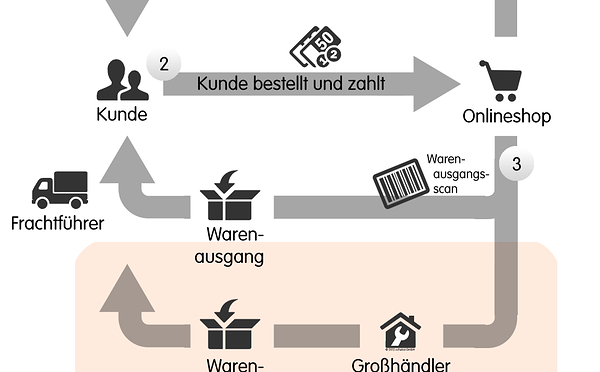This is iA the most comprehensive resource for this question on the internet.
We present views from Al Qalam, Islamweb, IslamQA, Sh. Asim Al-Hakeem and Sh. Muhammad Al Shareef then our resident expert Mufti Billal Omarjee presents his views, and finally IFG present a commercial perspective on the matter.
View One: Al Qalam
There are two principal issues of concern in the current practice of drop shipping. The first relates to the sale of what one does not own and the second relates to the sale of what is not in one’s possession.
As for the first issue, this may be overcome by using a salam contract between the online retailer and the customer [as identified in the question] for which the basic conditions are as follows:
- The contract is definite without an option to rescind.
- The product is properly specified.
- The product is a fungible.
- The contract is not for a specific item.
- The product is available in the market at the time of contract and, at the very least, at the time of delivery.
- The delivery of the product is deferred.
- The price is properly specified.
- The price is paid up in full at time of contract.
- The date and place of delivery are known.
- The product is not replaced with a different product.
However, the online retailer must first take possession of the product acquired from the manufacturer/wholesaler, either in person or by proxy, before the ownership of the retailer is complete. Whilst a salam contract may be contracted for what is not in one’s possession or ownership or what does not as of yet exist, it does not obviate the need for the online retailer to take possession of the product in order to effect proprietary transfer.[1] Therefore, the question remains as to how the retailer secures possession. In most cases, the manufacturer/wholesaler will be at a different location from the online retailer and so possession in person is not an option. This leaves only the option of possession by proxy. In a normal [non-salam] sale, whilst the manufacturer/wholesaler cannot be the proxy in his primary role as the vendor, he can be proxy subordinately under the instruction from the online retailer to deliver the product to the customer. Thus, under a normal sale, when the manufacturer/wholesaler forwards the product to the customer on behalf of the online retailer, the online retailer will be deemed to have secured possession of the product subordinately.[2] However, this does not hold true under a salam contract as, in the latter case, the salam contract alone does not effect proprietary transfer of a specific item but rather only confers the right to receive a non-specific item. Thus, the online retailer cannot appoint the manufacturer/wholesaler an agent to deliver the product to the customer as the specific product is not the property of the online retailer.[3] This leaves only the shipping company. However, the shipping company has a contractual relationship with the manufacturer/wholesaler and not with the online retailer. Thus, it does not appear possible to argue that the shipping company is proxy for the online retailer due to which the possession of the online retailer is realised. However, if the process is adjusted so that the shipping company has a contractual agreement with the online retailer to receive the product on behalf of the online retailer and then deliver it to the customer, then this can be valid. The possession of the shipping company will conclude the salam contract after which it will be charged to deliver the product to the customer.
And Allah knows best.
Mufti Mohammed Zubair Butt
Source: here
View Two: Islamweb
First of all, we thank you for your keenness on learning your religion and seeking to earn lawful earnings and fearing what is forbidden; you are absolutely right in doing this.
What you mentioned about the difference in some details of the Fataawa may be due to the difference of the questions of the questioners, as we answer each question according to its details.
In any case, the issue of dropshipping may be permissible and acceptable and it may not be so.
Among the permissible and acceptable cases where the owners of the sites display images of the goods while they do not own them are the following:
To sell by Salam Sale: In this sale the owner of the site agrees with the customer who demands the commodity to sell him a commodity with specific descriptions, which he receives from him at a specific time to which they both agree. This is exactly like what you mentioned in your question that the delivery date is determined; this is something required in the Salam Sale.
In a Salam Sale, it is also required that the buyer pays the price of the commodity directly in the meeting of the contract. Requesting the goods remain the liability of the owner of the site. Then the owner of the site shall request the described commodity from the factory or from its owner and buys it from him, and then asks him to ship it to the one who is buying it from his site directly, so that it can reach him at the appointed time that is agreed upon between both of them. This method is permissible. It exempts the owner of the site from the shipping fees, and it is also a way to avoid selling what one does not possess because it is not a sale of a particular commodity (which is physically present at the time of sale), but it is rather selling a described commodity, the description of which is based on the honesty of the seller (who is describing it). The conditioning of an appointed time is mandatory, such as determining a day for the delivery of the goods to the customer (the one who requested the commodity).
Ibn ‘Abbaas narrated that when the Prophet came to Madeenah, people were paying one, two and three years in advance for fruits, so he said: “ Whoever makes a Salam sale, let him do that with a known specified measure, a known specified weight, and appoint a known specified period (of time). ” [Al-Bukhaari and Muslim]
The second permissible method is: To inform the customer [who demands the commodity] that the site does not own the commodity displayed in the site, and that he (the owner of the site) will bring it to the customer from its owners. In this case, the owner of the site is only a broker and he is entitled to take a commission in return for the effort of bringing the commodity. In which case, he acts as an agent authorized by the customer who is demanding the commodity. Acting on behalf of someone else in return for a fee is permissible but he must determine his fee to the buyer. In this case as well, he will request the seller to ship the commodity directly to the customer.
The third permissible method for dropshipping in which the owner of the site does not bear the cost of the shipment, is when he is an agent for the owners of the commodity and he agrees with a factory or a given shop, to display the commodity on his site and sell it on their behalf, in return for a commission that is taken from the owner of the commodity. When the sale is concluded, he requests the owner of the commodity to ship it directly to the buyer.
In this last case, he [the owner of the site] conducts the sale contract directly with the customer because he is an agent for the owner of the commodity and acts as if he owns it.
Perhaps in these cases, there is a way out for the owners of sites to avoid selling what they do not possess, and at the same time get a certain profit.
For more benefit, please refer to Fataawa 27508 and 287650 .
Allah knows best.
Source: here
View Three: Shaykh Assim Al Hakeem
See here: https://www.youtube.com/watch?v=9BrIHPzPc64
View Four: Shaykh Muhammad Alshareef
See here: https://www.youtube.com/watch?v=y-pKWJtBKS0
View Five: IslamQA.org
1-Drop Shipping works in two different ways. The way expressed in the question is not clear. Hereunder are the two ways in which drop shipping is normally done.
Seller “A” advertises an item on the website such as e-bay. “A” does not have the item in his possession at the time of the advertisement. Purchaser “B” answers to this advertisement and places his order by paying the amount to “A”. Once “A” receives the order and payment into his account either via Paypal or a similar service, “A” further places an order to the wholesale merchant (drop shipper) “C” at a wholesale price. “C” then dispatches the merchandise to “B” while “A” keeps the difference of listed price and wholesale price as his profit.
This way of drop-shipping is not permissible since “A” is selling an item which is not in his possession.[1]
The shariah compliant alternative for this form of drop-shipping is to do the transaction through the model of “ Salam ”. In Salam after receiving the money, “A” (muslam ilayh) will purchase the item from the wholesaler “C” and then make “C” his agent to deliver the item to “B”. The process would remain same except for that the following information will have to be explicitly advertised.
- Seller “A” would have to pronounce in his advertisement beforehand that he is not in possession of the item and will arrange its delivery once the rabbul maal “B” has paid the money.
- Complete description of the item being sold will have to be advertised.
- The time duration for delivery will have to be advertised.
Source: here
Mufti Billal Omarjee view
The conventional way of doing dropshipping is indeed not permissible. The alternative by far is the Salam method of trading.
The Maliki opinion seems to fit the conventional method of doing dropshipping. Which is to sell something before taking possession of the asset. However the issue remains that in order to sell this asset, the liability must have been at least transferred between the first sell and the first buyer. Once it is done then the first buyer can then sell the asset to a second buyer even though he has not taken possession of the asset before the sale. So for example: A who is in the UK, orders a mobile phone from B who is in China. A can sell the mobile to C who is based in the USA. A asks B to ship the mobile directly to C. In the Maliki school of jurisprudence this transaction would be valid provided that the liability for the mobile was transferred between A and B prior to A selling the mobile to C.
And Allah knows best!
The IFG view
The Islamweb fatwa give an excellent summary of the potential ways in which a transaction can be structured so as to make a dropshipping model work within the sharia frameworks. Using Islamic structures such as salam, murabaha and wakala (agency), an Islamic solution to each dropshipping business’s situation should be met.
Given the wide variety of dropshipping models, it is best to check in with a scholar before embarking on a novel dropshipping business structure, however there should usually be an easy way to structure things to make the business sharia-compliant.
Commercially, it strikes me that the easiest of these options is to clarify on your website that you use dropshipping. That clarifies to any buyer that this is the situation. Given most people do not read the legal terms and conditions anyway, we wouldn’t expect this to have any commercial impact.
Please also watch our detailed discussion of this whole area here:

